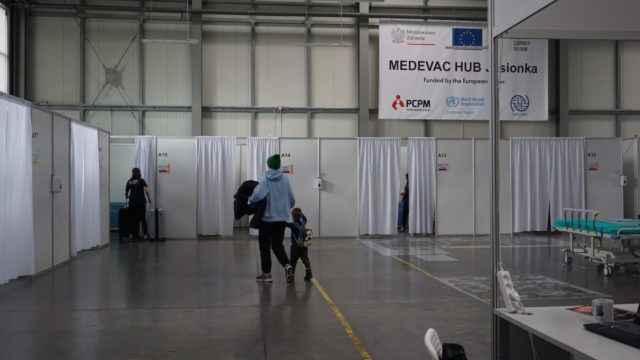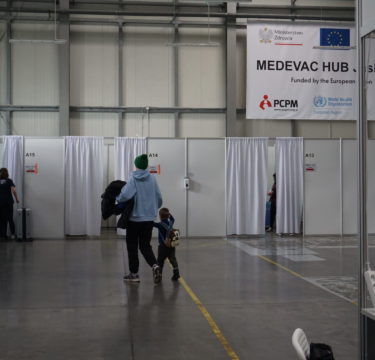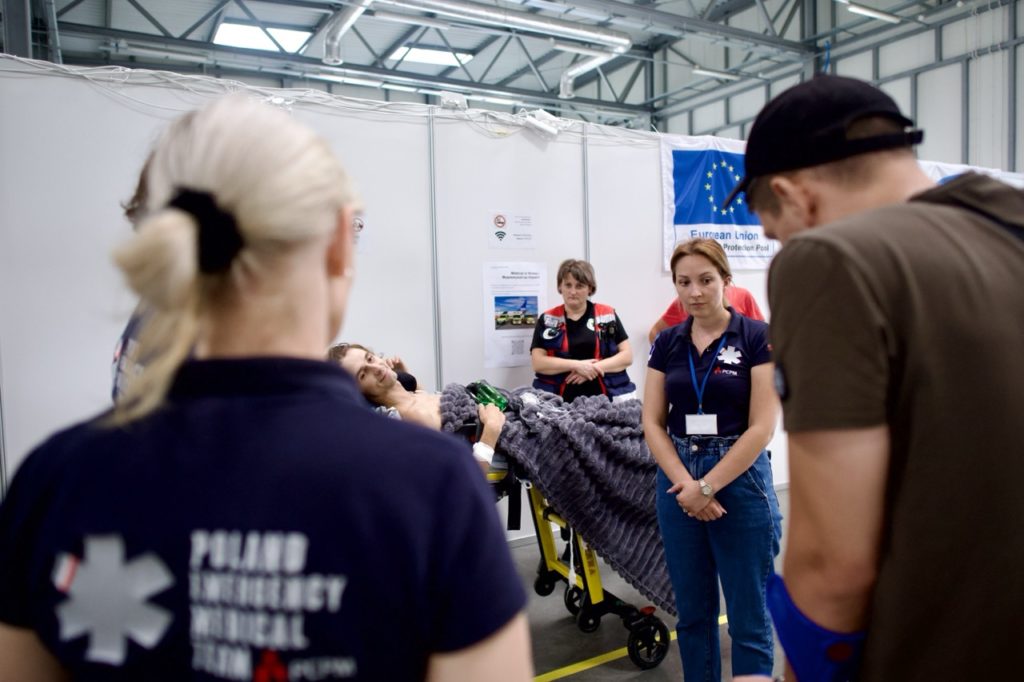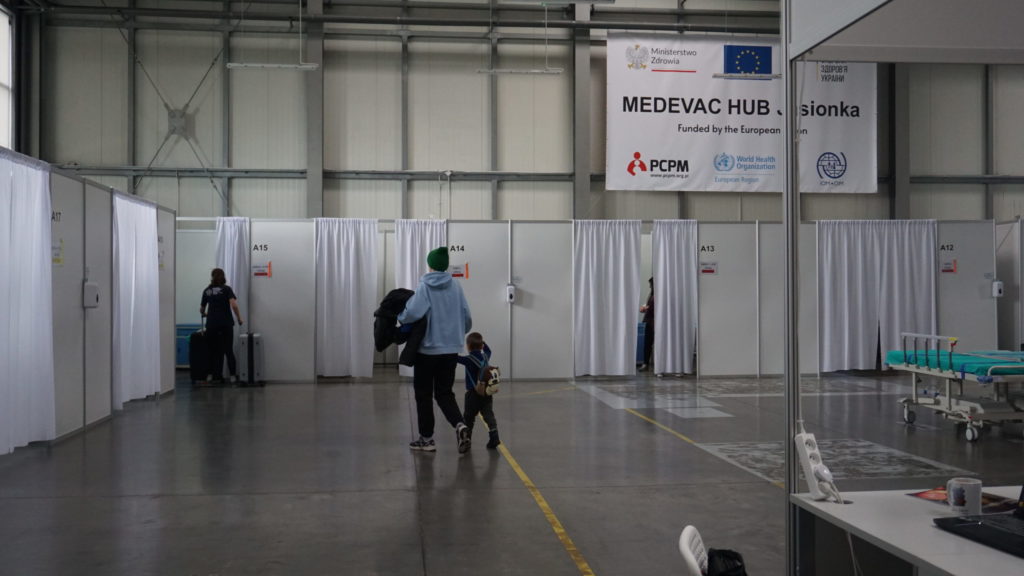It’s not a hospital, but the experience is truly one of a kind


Lacerations, gunshot wounds, pre- and post-amputation states. Doctors at the MEDEVAC HUB Jasionka work with patients rarely seen in other Polish facilities. The Hub isn’t a hospital, but a medical stopover for patients from Ukraine before their transport for further treatment to hospitals across Europe.
Where Medicine Meets War and Hope
In Jasionka, right by the Rzeszów airport, a unique medical evacuation hub has been operating since 2022. It employs doctors, nurses, psychologists, and logistics specialists daily, helping patients from Ukraine as part of a European Union system.
“It’s a stopover for a wounded or oncology patient from Ukraine on their way to treatment in hospitals in European countries,” explains Adam Szyszka, MEDEVAC HUB Team Leader, who manages the facility’s daily operations.

Patients are transported by ambulance from various locations in Ukraine. They typically spend about 24 hours at the hub with their accompanying persons.
“The medical team focuses on wound cleaning and dressing, changing bandages, implementing broad-spectrum antibiotic therapy, and comprehensive pain management and psychological support. Although patients are usually stable, the staff is prepared to perform advanced life-saving procedures,” explains Dr. Piotr Grabski, a doctor working at the Hub.
Then, in coordination with the European Commission, the patient is transported by a special aircraft to a hospital that has agreed to admit such a person for further treatment. After treatment, the patient returns to Ukraine the same way: first by plane to Jasionka, and then by land transport to the hospital they initially departed from.
Nowhere Else Like It in Europe
The uniqueness of this place comes from a combination of several elements: medical architecture, operational procedures, and contingency plans, especially since the Ukrainian border, where active hostilities are ongoing, is less than 100 km away.
Daily work at the MEDEVAC HUB involves confronting cases of war injuries and complex clinical problems rarely encountered in other facilities in Poland.
“Working at the Hub is challenging and a unique experience, given the specific nature of the patients and their injuries, most often resulting from military operations,” explains Dr. Grabski.
Patients arrive with lacerations, gunshot wounds, amputations, and extensive burns. They often have infected wounds, symptoms of sepsis, and dehydration, resulting from multi-day transport without dressing changes. Among them are also individuals with co-existing conditions such as heart disease, diabetes, or respiratory infections that were not adequately treated in Ukraine. There are also many oncology patients, including children, requiring urgent continuation of therapy.
“As a team, we strive to do everything possible to ensure our patients reach their destination facilities in the best possible condition and can continue their treatment as quickly as possible,” says Dr. Grabski.
There’s a Plan, But Anything Can Happen
Working at the MEDEVAC HUB Jasionka isn’t just about providing aid; it’s also about intense professional development. Doctors learn self-reliance, quick decision-making, and how to care for clinically complex patients. It’s also an excellent opportunity to hone skills in selecting pharmacotherapy and types of dressings for difficult cases, and to develop non-medical competencies like effective communication, decision-making, and efficient patient handover, which significantly enhances patient safety, especially in critical situations.

“Working at the Hub offers many opportunities for development in wound care and pain management. The team consists of doctors, nurses, paramedics (mostly from the Poland Emergency Medical Team), psychologists, and translators. Thanks to the diversity of professional experience, they can provide holistic care,” says Dr. Agata Łukasik, an infectious disease doctor. “Our whole team consists of excellent medical professionals, so it’s truly a great pleasure to work with such people,” adds Dr. Łukasik.
“We can learn a lot from each other because each of us works daily in different places—from emergency medical services teams, through emergency departments, surgery, internal medicine, to pediatrics.”
“It also means international contacts, working with an experienced team, and trauma cases rarely encountered in everyday peacetime work,” adds Dr. Paweł Graczyk, an orthopedist working at the MEDEVAC HUB.
The shift leader from the nursing and paramedic staff coordinates the team’s activities, allowing the doctor to focus on treatment. Each shift begins with a detailed briefing discussing the number and condition of anticipated patients and the plan for further evacuation. Upon the convoy’s arrival, triage takes place—an initial selection of individuals requiring urgent assistance. Patients are informed about the Hub’s operating principles and further evacuation plans, receive a meal, and are then examined by doctors. In addition to medical care, meals, assistance with hygiene, and psychological support are provided.
“The toughest moments? We have a whole range of painkillers and try to help everyone the best we can, but sometimes it’s not 100% possible. It’s always hard to do everything you can, and yet know it’s not enough,” admits Dr. Łukasik.
Dr. Graczyk admits it’s not easy work, but…
“There’s a huge array of other emotions, such as empathy, care, and compassion, which contribute to the immense satisfaction of helping them,” concludes Dr. Paweł Graczyk.
Satisfaction That Transcends Ordinary Duties
Despite many challenges, working at the MEDEVAC HUB Jasionka brings immense satisfaction. The team consists of experienced and dedicated medical professionals. Patients often express gratitude for daily, seemingly small gestures—a dressing change, a shower, painkillers, or psychological support.
“The greatest satisfaction comes from meeting our patients returning to Ukraine after many weeks of treatment, in good shape, often very determined to continue their fight. It’s a real pleasure to work with our very experienced and always eager-to-help team,” concludes Dr. Grabski.
The Hub is currently looking for doctors willing to take on this mission.
What is MEDEVAC HUB?
MEDEVAC HUB Jasionka began operations in September 2022, an initiative of the Polish and Ukrainian health ministries. It is a crucial medical stopover point for patients from Ukraine awaiting specialist treatment in facilities across Europe.
The Hub is financed by European Union funds and supported by the International Organization for Migration, the Polish Ministry of Health, the World Health Organization, and the Podkarpackie Voivodeship. In 2024, it admitted 1044 people, including 662 patients, most of whom went for treatment to Germany, Norway, Sweden, the Netherlands, and Denmark. The Hub also received 134 patients returning to Ukraine and 248 accompanying persons. Since its inception, over 3,000 people from Ukraine have passed through the Hub.